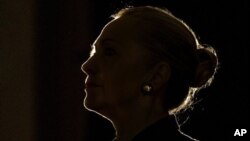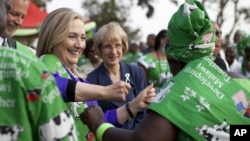CAPE TOWN — U.S. Secretary of State Hillary Clinton wrapped up her visit to South Africa Wednesday with a speech to students at the University of the Western Cape, which she honored as a "vanguard" of the anti-apartheid movement.
Clinton called on South Africans to live up to the legacy of Nelson Mandela and the country to take a larger role in promoting democracy and human rights throughout the world.
Clinton told university students in Cape Town that it is up to them to define South Africa's future and approach to the world.
"You will decide whether South Africa moves forward and not backward. You will decide whether South Africa seeks to erase old dividing lines in global politics," she said. "You will decide whether South Africa sets aside old suspicions and instincts and embraces new partnerships tailored to 21st-century challenges."
Earlier in her visit, Clinton called South Africa the "centerpiece" of her 11-day tour of the continent, aimed at selling America's Africa strategy, defined as forming mutually beneficial partnerships with nations that bolster peace, democracy, human rights and economic growth.
"Now I've often heard it said that African problems need African solutions," she said. "Well, I'm here to say that some of our global problems need African solutions too. And few nations on this continent can carry as much weight or be as effective partners and leaders as South Africa."
South Africa holds a rotating seat on the U.N. Security Council and currently holds the rotating presidency of the African Union.
Clinton spoke after two days of high-level talks aimed at promoting trade and American investment in South Africa, as well as addressing regional and global security issues.
"South Africa and the United States have not always seen eye-to-eye in this area, particularly at the height of the crises in Libya and Cote d'Ivoire, but the differences we have between us in these moments are over tactics not principals," she said. "That should not obscure our many shared goals, supporting the political transition in Somalia and combating piracy, from addressing the threat of terrorism and violent extremism across the Sahel to reinforcing the peace between Sudan and South Sudan."
Most recently, the United States and South Africa disagreed on proposed U.N. Security Council resolutions to sanction Syrian President Bashar al-Assad.
South Africa, Clinton said, is one of many democracies in the "global South" that are "wary of intervention" into other countries' internal affairs.
"We all have to recognize that anywhere in any place where human rights are abused and democracy -- true democracy -- denied, the international community must apply pressure to help bring about positive change. No one understands that better than South Africa."
She also called on South Africa, the first country to voluntarily give up nuclear weapons, to play a greater role in curbing Iran's pursuit of nuclear weapons and keeping nuclear materials out of the hands of terrorists, and she praised the country's role in the political transition in Zimbabwe -- the ongoing work of drafting a new constitution and organizing a referendum and ultimately free and fair elections.
"When old friends in power become corrupt and repressive, a decision by South Africa to stand on the side of freedom is not a sign that you are giving up on old allies," she said. "It's a reminder to yourselves and the world that your values don't stop at your borders."
The U.S. and South Africa, Clinton said, share a "deep and abiding" connection founded in both countries' histories of confronting and healing from oppression.
Clinton began this visit to South Africa by visiting freedom fighter and former president Nelson Mandela at his home in Qunu.
She opened and closed her speech Wednesday with memories of her first trip to South Africa for the inauguration of the now 94-year-old leader.
Clinton called upon South Africa to continue Mandela's struggle for human dignity and opportunity not only at home, but also abroad.
Photo Gallery: Hillary Clinton's Africa Tour
Photo Gallery: Hillary Clinton's Africa Tour





